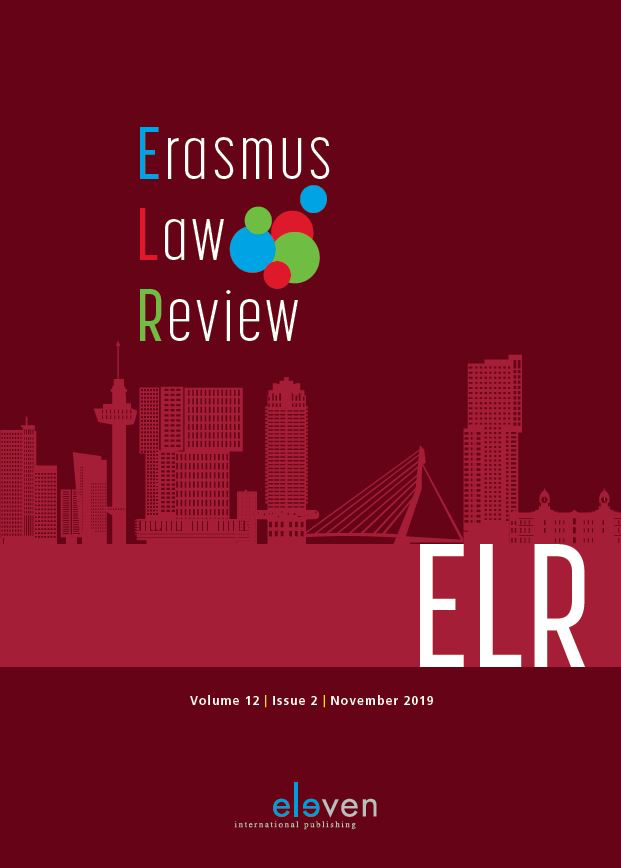|
We survey the theoretical and empirical literature on local and international tax competition in Economics. On the basis of this survey, we discuss whether EU countries should harmonise tax policies to prevent a race to the bottom. Much of the evidence suggests that tax competition does not lead to significant reductions in tax revenues. Therefore, we conclude that tax coordination is in all likelihood unnecessary to prevent inefficiently low levels of taxation in the EU. But since the evidence against the adverse effects of tax competition is not unambiguous, we also discuss whether intergovernmental transfers might be a less invasive means than outright tax harmonisation to prevent a race to the bottom. |


Erasmus Law Review
About this journalSubscribe to the email alerts for this journal here to receive notifications when a new issue is at your disposal.
| Editorial |
|
| Authors | Prof. Arnaud de Graaf and Prof. dr. Klaus Heine |
| Author's information |
| Article |
|
| Keywords | tax competition, tax coordination, European Union, fiscal federalism |
| Authors | Thushyanthan Baskaran Ph.D. and Mariana Lopes da Fonseca |
| AbstractAuthor's information |
| Article |
|
| Keywords | tax planning, optimal taxation, tax competition, corporate taxation |
| Authors | Hendrik Vrijburg Ph.D. |
| AbstractAuthor's information |
|
This article presents a literature review on the welfare effects of excessive company taxation practices. The article intends to structure the debate by sketching a conceptual framework of thought for the topic under consideration and places the existing literature within this framework. The article ends with a thought-provoking discussion between two extreme papers in the literature, one against tax planning and one in favour. The discussion is concluded by identifying the fundamental differences in assumptions underlying both approaches. |
| Article |
|
| Keywords | tax competition, tax planning, European Union, Common Consolidated Corporate Tax Base, factor manipulation |
| Authors | Maarten de Wilde LL.M |
| AbstractAuthor's information |
|
The author addresses the phenomenon of taxable profit-shifting operations undertaken by multinationals in response to countries competing for corporate tax bases within the European Union. The central question is whether this might be a relic of the past when the European Commission’s proposal for a Council Directive on a Common Consolidated Corporate Tax Base sees the light of day. Or would the EU-wide corporate tax system provide incentives for multinationals to pursue artificial tax base-shifting practices within the EU, potentially invigorating the risk of undue governmental tax competition responses? The author’s tentative answer on the potential for artificial base shifting and undue tax competition is in the affirmative. Today, the issue of harmful tax competition within the EU seems to have been pushed back as a result of the soft law approaches that were initiated in the late 1990s and early 2000s. But things might change if the CCCTB proposal as currently drafted enters into force. There may be a risk that substantial parts of the EU tax base would instantly become mobile as of that day. As the EU Member States at that time seem to have only a single tool available to respond to this – the tax rate – that may perhaps initiate an undesirable race for the EU tax base, at least theoretically. |
| Article |
|
| Keywords | company tax harmonisation, EU law, Internal Market, taxation policies |
| Authors | Anna Sting LL.M |
| AbstractAuthor's information |
|
Company tax integration in the EU is yet to be realised. This article first outlines the main benefits of company tax integration for the Economic and Monetary Union, and also discusses the main legal obstacles the EU Treaties pose for harmonisation of company tax. The main problem identified is the unanimity requirement in the legal basis of Article 115 TFEU. As this requirement is currently not feasible in the political climate of the debt crisis, this article assesses possible reasons for and ways to further fiscal integration. It considers Treaty change, enhanced cooperation, soft law approaches and also indirect harmonisation through the new system of economic governance. Eventually, a possible non-EU option is considered. However, this article recommends making use of the current EU law framework, such as soft law approaches and the system of the new economic governance to achieve a more subtle and less intrusive tax harmonisation, or instead a Treaty change that would legitimately enhance and further economic integration in the field of taxation. |

 Issue 4
Issue 4